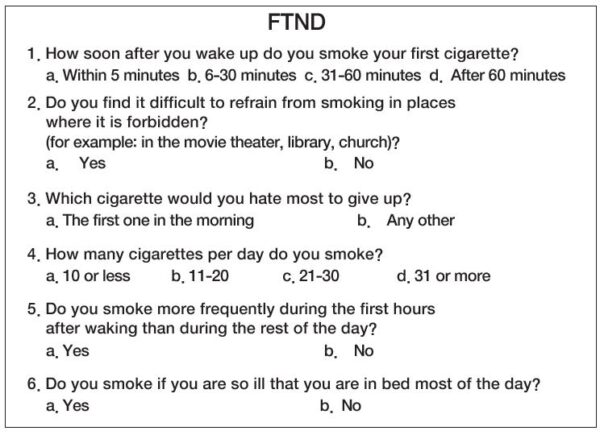
Understanding and Applying Psychological Assessments Is Crucial
By Namwook Cho L.Ac
It is not rare that a patient asks for help to quit smoking by acupuncture treatment. Any experienced acupuncturist feels confident to help with various acupuncture techniques and herbal medicines to suppress nicotine cravings and mood disorders such as anger, frustration, depression, restlessness, and anxiety.
Evaluating specific mood disorders with proper questionnaires is important. The test results could be used to compare before and after the treatment, help to understand objective progress, and it could be used for motivation to continue the sessions.
The first tool for evaluating how much the patient depends on nicotine is FTND (Fagerstrom Test for Nicoline Dependence). It is easy to get the patient’s response and to interpret the dependency’s seriousness. The rest testing forms are introduced for specific symptoms.
Traditional treatment with a proper understanding of the patient’s psychological status will make your treatment more effective.
Understanding Treatment for Nicotine Withdrawal Symptoms
Psychological Evaluations Should Be Done Before Starting Treatment
Smoking is a dependence on nicotine and a kind of addiction symptom, and it is necessary to develop a systematic program to succeed in quitting smoking through a professional approach and then completely quit smoking through steady management.
Unlike other musculoskeletal-related pain management, treatment for help quitting smoking is affected by many psychological factors. The most common and critical symptoms shown among those who recently quit smoking include nicotine cravings, anger, depression, anxiety, fatigue, difficulty concentrating and insomnia. Frequently, sudden increases or decreases in appetite could be shown.
Patients subject to smoking cessation treatment covered in this clinical practice guideline are not separately classified with diverse dependence on smoking but are targeted at patients who visited traditional Korean medical institutions for smoking cessation treatment.
Evaluation: Helping a patient who wants to quit smoking requires a psychological evaluation. The tool mostly used and recommended by the manual is FTND (Fagerstrom Test for Nicoline Dependence). In scoring the Fagerstrom Test for Nicotine Dependence, yes/no items are scored from 0 to 1, and multiple-choice items are scored from 0 to 3. The items are summed to yield a total score of 0~10. The higher the total Fagerstrom score, the more intense the patient’s physical dependence on nicotine.
And the amount of depressional feels due to stop smoking should be evaluated by various psychological tests such as:
HAMD (Hamilton rating scale for depression), FTND (Fagerstrom Nicotine Dependence Test), HHWQ (Hughes and Hatsukami’s nicotine withdrawal symptom score), MNWS (Minnesota Nicotine Withdrawal Scale), BDI (Beck Depression Inventory), BAI (Beck Anxiety Inventory), CWS21 (Cigarette Withdrawal Scale-21), SRI (Stress Response Inventory), QSU (Questionnaire on Smoking Urges), SCL90 (Symptom Checklist-90), and MPSS (Mood and Physical Symptoms Scale).
The test tool could evaluate how much a patient depended on the material, prognosis, and treatment effectiveness.
Treatment
- Acupuncture Treatment: Most frequently used acupoints are ST36, LU7, HT7, LI4, LU6, GV20 and EX-NH3. ST36 helps control dopamine secretion to release anxiety and stress due to stopping smoking. LU7 suppresses the desire to smoke. LI4 enhances Qi movements of the lung, and insomnia, depression, and anxiety symptoms could be eased. GV20 prevents fatigue, dizziness, and headache.
- Herbal medicine: Seihaito (清肺湯) and Suan Zao Ren San(酸棗仁散) are recommended. Specially Suan Zao Ren is the seed of Ziziphus spinosa which has long been used to calm the mind, promote sleep, and treat hypertension, palpitation and poor memory in Asian medicine. And if the patient shows distinctive psychological symptoms, herbal formula for the symptom could be added.





































